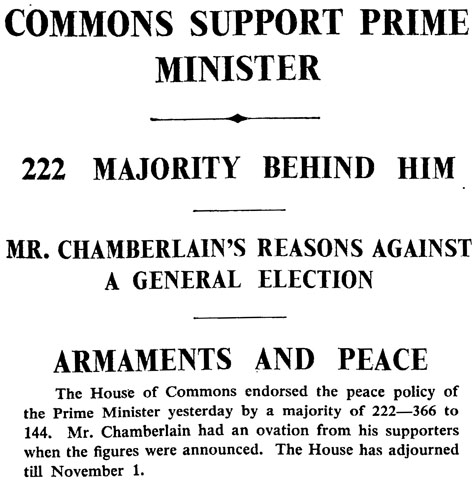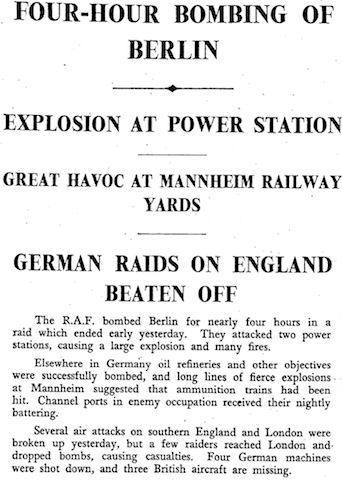
Politics intrudes onto the front page of the Daily Mail today, in the form of a Cabinet reshuffle. But this being wartime, people are perhaps more likely to invest these normally mundane ministerial changes with great significance. The Mail certainly does, leading with the story that Sir John Reith, former Director-General of the BBC (and more recently chairman of Imperial Airways, Minister of Information and Minister of Transport) has been given the job of planning for the post-war reconstruction of Britain, or at least its buildings — though the ‘large-scale slum clearances’ envisaged would certainly have a social impact. Reith will also be looking at more immediate repairs for those buildings which can’t wait, and ‘in all probability start[ing] an immediate investigation into the question of providing more and better air-raid shelters’. But it’s the optimistic ‘Planning now for day of victory’ angle which the Mail plays up.
The other big change is probably the promotion by Churchill of Ernest Bevin, Minister of Labour, into the War Cabinet in order to ‘represent the trade unions’. The reshuffle was occasioned by the resignation of Neville Chamberlain as Lord President of the Council, on the grounds of ill health. He may be up for a peerage.
The war changes the news in other ways too. Another story on the front page, a short one, records that ‘a large elementary school in a Midlands town’ was bombed by a raider yesterday. ‘Some’ of the four hundred pupils were killed and others wounded. In peacetime, the deaths of children at a school would be regarded as a national tragedy. Here there is only room to note that soon afterwards, ‘the children who escaped were singing “Roll Out the Barrel,” led by their teachers’.
And then there are stories which would just make no sense whatsoever if not for the war. Jennifer Godfrey-Jull, an Oxford nurse, has been jailed (actually it says ‘gaoled’, but although I’m usually a stickler for British spelling that never looks right to me) for a month. Her crime was violating the black-out:
It was alleged that the nurse went to a friend’s room [in the hospital] and switched the light on and off several times.
Her matron ‘wanted the case dealt with severely as a warning to other members of the staff’. Sounds like a happy workplace.
The reprisals controversy rumbles on. Two letters on the subject are published today (3). The first is from Major-General (retired) H. W. Higginson of Fleet, who thinks the quickest way to victory will be to reduce Germany’s fighting ability by bombing purely military objectives:
It is questionable whether the slaughter of thousands of German civilians would have this effect now.
But:
When we have achieved complete superiority in the air we will be able to take action against the civilian population if this should be necessary.
Mrs E. M. McMillan of Ormskirk seems to be under no doubt some form of ‘action against the civilian population’ is in fact necessary:
As a cancer or a poisonous weed should be ruthlessly cut out, so must the German race be utterly and definitely purged of all its evil powers.
She doesn’t say what method she would use to achieve this end, but as hers is the first letter in a section headed ‘Reprisals’ the conclusion we are meant to draw seems clear.
The Mail is still trying to get across the idea that what Bomber Command is doing to Germany pretty much qualifies as reprisals. There’s a photo on page 6 of a bomb crater ‘In the Heart of Berlin’, in ‘Berlin’s “Piccadilly”‘, Unter-den-Linden (the Brandenburg Gate is visible in the background). An article on the front page entitled ‘Blitzkrieg boomerang’ reports the following news items broadcast from German and Italian radio stations:
(1) Berlin yesterday evacuated 5,000 women and children, all members of the Nazi Party; (2) Berlin claims that in the last two nights of R.A.F. raiding there were 2,543 German casualties; (3) Germany admits the destruction of “a very important factory” in Western Germany, and Goebbels is promising the German people “the most severe reprisals”; (4) Berlin makes the (for them) astonishing admission that Germany on Wednesday lost 12 ‘planes while the R.A.F. lost one. The R.A.F. claims 10 to 1.
Incidentally, a review on page 3 of a West End production of All’s Well That Ends Well has one of the few uses I’ve noticed so far of a certain word I expected to see a lot more:
THE BARD BEATS THE BLITZ
And finally, a quote from today’s ‘The War Surveyed’, Strategicus’ column in the Spectator (334):
IT is now recognised that we have reached the end of a phase of the air-war, and it is difficult to escape the conclusion that it was a major phase of the war in general. The conviction that we have defeated the Germans and passed through a very dangerous crisis seems inevitable […]
(This conclusion is not just based on the relative number of aircraft downed, or the ever-changing yet rarely-successful Luftwaffe tactics, but the timing of the German-Italian alliance with Japan, which Strategicus takes as an admission of German weakness.) So this is yet another indication that a turning point has been reached, at least as far as perceptions are concerned. This is not to say that Strategicus thinks it’s plain sailing (or flying) from here on in: he ‘cannot but feel that the possibilities of an unlimited air-campaign have not yet been reached’, and as far as morale is concerned, ‘The courage which will prevail must be active and not merely passive’. Watch this space.
![]() This work is licensed under a Creative Commons Attribution-NonCommercial-NoDerivatives 4.0 International License.
Permissions beyond the scope of this license may be available at http://airminded.org/copyright/.
This work is licensed under a Creative Commons Attribution-NonCommercial-NoDerivatives 4.0 International License.
Permissions beyond the scope of this license may be available at http://airminded.org/copyright/.



